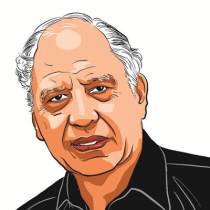Sir Vidia’s antipathies
There is an urge now to separate VS Naipaul’s creative writing from the political. But you have to take his worldview and the flashlight with which he exposed hypocrisies as one entity.

Naipaul was equally severe with the believers (in Among the Believers) later was a bit of a consolation to Hindutva types. (Illustration: CR Sasikumar)
You had to be prepared for both despair and elation, reading VS Naipaul. I was disappointed by his An Area of Darkness, where I thought he was almost physically assaulting India, and unconsciously, his own past. How we revelled in Nissim Ezekiel’s masterly riposte to the book. But let it be said that our entire work culture those days needed a kick in the butt to shake us out of our complacency. I never forgot during those years that he was a stubborn Bihari, who lived in Trinidad which he abhorred, and found his place in England. Later, I compared his India: A Wounded Civilization with Nirad Chaudhuri’s The Continent of Circe, named after the goddess who turned people into swine. Rightly or wrongly, I said in my piece, “Naipaul is like a mother bird rummaging in a nest of doubts. Nirad is blessed with certitudes that almost reek of arrogance.”
That Naipaul was equally severe with the believers (in Among the Believers) later was a bit of a consolation to Hindutva types. An across-the-board scorn was hardly a stepladder for greatness. He was ripe for greater things and I felt cheated when he let his antipathies get the better of him. It didn’t occur to me then that the very fact he made you feel for him and his writing was itself a mark of something special.
Today, one needs to separate the man from his writing, and the creative writing from the political, where his prejudices came to the fore. You couldn’t be more wrong. You have to take the man, the literary giant, his worldview and the flashlight with which he exposed your hypocrisies as one larger-than-life entity. And when these social critics decry some of his non-fiction, it needs to be remembered that he did not swerve from the truth as he saw it, and he shoved his opinions in your face. Let us remember him for his honesty as well. A lesser man would have hidden his dislike for his birthplace, Trinidad. Remember what he said of Trinidad in an interview, “I was born there, yes, I thought it was a great mistake.”
Yet as his memoirs show, nothing can excuse the man for his misogyny and, as Girish Karnad and Taslima Nasreen have said, for being Islam-phobic.
But first things first. I was disappointed with the title, A Bend in the River, for I knew he had filched it from Manohar Malgonkar’s A Bend in the Ganges, a wonderful novel in its own right though we have forgotten Malgonkar. The Observer called Naipaul “The greatest living writer of English prose”, and I for one would agree. Take the way he starts The Mimic Men. I have yet to see a better beginning. The narrator comes to a London boarding-house. “The boarding-house was owned by Mr. Shylock. He didn’t live there but the attic was reserved for him; and Lieni, the Maltese housekeeper, told me he occasionally spent a night there with a young girl. ‘These English girls!’ Leini said. She herself lived in the basement with her illegitimate child. An early postwar adventure. Between attic and basement, pleasure and its penalty, we boarders lived, narrowly.” So much irony in those short crisp sentences. If only he had not called the owner Mr Shylock.
The sense of comedy never left him. In The Suffrage of Elvira (1957), his second novel, he tackled elections in a village setting in colonial Trinidad. “I promising you,” said Mrs Baksh, “for all it begin sweet sweet, it going to end damn sour”. And as the candidate says of his constituency “Elvira you is a bitch”. All this a decade before Salman Rushdie put various lingos and speech rhythms in a juice blender and came out with his famous chutney.
I loved The Mystic Masseur, and the metaphor about books by weight; couldn’t stand A House for Mr Biswas, surprisingly. His last two novels which I read were Half a Life (2001) and Magic Seeds (2004). In Half a Life he is at his wickedest, starting with a visit from Somerset Maugham to a mendicant, and how the conversation gets distorted in Maugham’s The Razor’s Edge — accusing another novelist of fraud, isn’t he? Naipaul, one would rate a notch or two higher than Maugham, but then they belonged to different eras. My father told me that Maugham would visit an island in the south-east, send a team inside to find out if there had been some big scandal, and then turn it into a story. Oh these English novelists, if I may be permitted to ape Lieni, the Maltese housekeeper.
Half the pleasure in reading Naipaul is in his immaculate prose: “Never far away, marked by scratchings of maize and cassava and other things, were straight neat lines and roofs of a long fine grass that seemed at times to catch the sun and then shone like long well-brushed hair.”
The nearest I came to the great man was in that famous conference at Neemrana. I was billeted with Khushwant Singh in a huge room — and realised that we were the oldest in the crowd. First, he was rude to the American ambassador’s wife. One heard the buzz but never got to know what he said to her. In a session on colonial literature, he attacked Nayantara Sahgal by shouting: “How long are you going to beat the colonial drum!” To be fair, he was railing against a tendency, not what Sahgal had said. Later Chandrashekhar Kambar, now the president of the Sahitya Akademi, sang his ironic requiem on the death of Mao.
One last word on two despairs Naipaul and Salman Rushdie aroused in us. One gawked at Salman’s brilliance, till he buried us in a deluge of unnecessary verbal pyrotechnics. The despair Sir Vidia left us with was that in a hundred years, we’d never be able to write half as well as him.
Daruwalla, a poet and short story writer, was awarded the Sahitya Akademi Award in 1984
For all the latest Opinion News, download Indian Express App
More From Keki N. Daruwalla
Of symbols and the symbolised
Encounters In The Dark
Heart of darkness
Babri Masjid is more than a ‘dilapidated’ structure. And Kathua is about biases...
If governments want, they can discourage the dishonourable practice ..
All this is going to have an effect on the polity and the way we will go about our democratic or undemocratic ways. If the…







































No hay comentarios:
Publicar un comentario